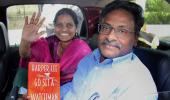Former Delhi University professor G N Saibaba, who was released from the Nagpur Central Jail on Thursday after his acquittal in an alleged Maoist links case, said it's a 'wonder that he could come out alive' despite suffering the 'brutal' jail life.

Saibaba, 54, said he was targeted for working for the rights of tribals in central and eastern parts of the country and called his arrest an 'afterthought'.
The Bombay high court on Tuesday set aside the life sentence of Saibaba, noting that the prosecution had failed to prove the charges beyond a reasonable doubt.
"There was every chance that I would not have come out alive," Saibaba told media persons.
He had earlier refused to talk to the press saying, "My health is very bad. I can't talk. I will have to first take medical treatment, and then only I will be able to speak."
The former DU professor, who depends on a wheelchair for mobility, said he changed his mind after requests from lawyers and reporters.
Saibaba said he would be visiting doctors soon.
Recalling his incarceration at the Nagpur jail, which he described as 'very rigorous and brutal', Saibaba said it barely provided any accessibility.
"I couldn't pull up, I could not move out of my wheelchair. I could not go to the toilet (on my own), I could not take a bath. It's a wonder that I came out of the prison alive today," he said, stressing that there was every chance that he could not have made it.
The former professor also called the case against him a fabricated one.
"Today, you can see, not once but twice, that the higher judiciary confirmed that this case is without facts, evidence and any legally viable matter. Why has it drawn so long? Ten years of my life and my co-accused's life. Who will bring them back?"
A family member was waiting for Saibaba outside the jail when he came out in the morning.
Saibaba said he was targeted for working for the rights of Adivasis in the central and eastern parts of the country.
Before his arrest, the former English professor said, he had been asked by eminent personalities like Justice Sachar and ex-IAS officer B D Sharma to coordinate with human rights outfits, civil society groups and Dalit organisations to bring unity among democratic voices as well as raise the issues of tribals.
He said tribals suffered a lot and their land was grabbed during 'Salwa Judum', a state-sponsored people's resistance movement against Naxalites, in Chhattisgarh.
He had also been asked by international rights organisations and certain wings of the United Nations to document the sufferings of tribals in central and eastern India, said the former DU professor.
"However, the then government did not like my work," he claimed.
"I was implicated as an afterthought in a case that was filed ten months ago at that time," he claimed.
Saibaba said he entered the prison as a healthy man except for polio and his dependence on a wheelchair but now has a host of health issues, including heart, muscle and liver problems.
"Doctors said I had to undergo multiple operations and surgeries but nothing was done. My heart is working at only 55 per cent capacity and this has been recorded by the doctors," claimed Saibaba.
He alleged that he was not provided with 'active medical treatment' despite his poor health.
"Why ten years of injustice," he asked, adding that hope was the only thing that kept him going.
The former English professor said a tribal named Pandu Narote from Maharashtra's Gadchiroli district who was in the same anda' cell with him died during incarceration.
"He was also falsely implicated he was a young man who had never come out of his village. He died of a simple fever," he said.
Saibaba said he was heartbroken that Narote was not with him during his release from jail.
Asked if he would continue with his work on human rights, Saibaba said a change would be imminent even if the Constitution of India is implemented 50 per cent in letter and spirit.
Whether he would join DU again, Saibaba said he cannot live without teaching.
Saibaba also remembered advocate Surendra Gadling (now in jail in connection with the Bhima Koregaon case), who fought his case in Gadchiroli.
Saibaba said there were 'indications that he would be witchhunted'.
Saibaba had been lodged in the jail here since 2017 after his conviction by a trial court in Maharashtra's Gadchiroli district.
Before that, he was in prison from 2014 to 2016 and was subsequently granted bail.
The HC on Tuesday overturned Saibaba's sentence, terming the sanction for prosecution granted under the Unlawful Activities (Prevention) Act (UAPA) as 'null and void'.
The court said the sanction given under UAPA by the state authority was without application of mind and the report submitted by the independent authority recommending invocation of UAPA provisions in the case was 'cryptic and a laconic half page communication'.
The bench also noted that seizure of some pamphlets and electronic data from the accused merely demonstrated that they were sympathisers of the Maoist philosophy.
In March 2017, a sessions court in Gadchiroli convicted Saibaba and five others, including a journalist and a Jawaharlal Nehru University (JNU) student, for alleged Maoist links and for indulging in activities amounting to waging war against the country.









